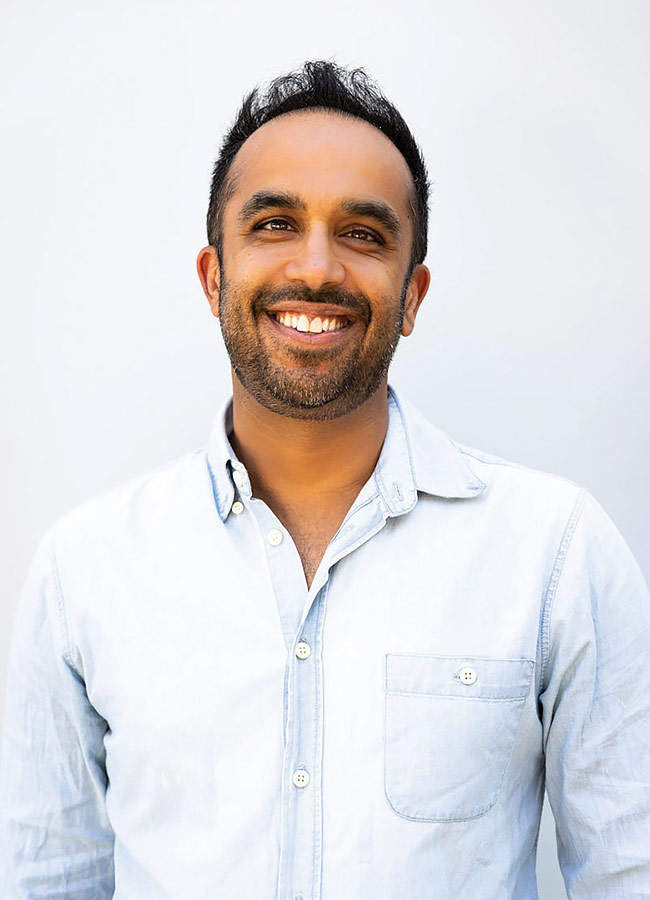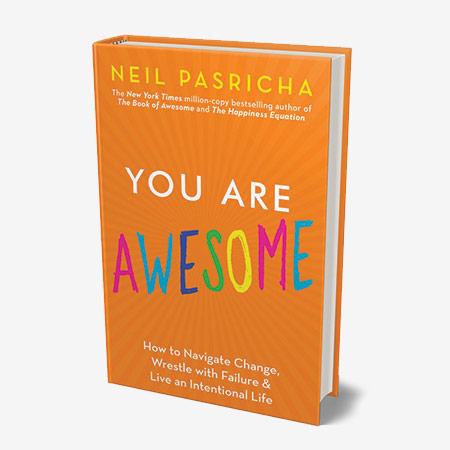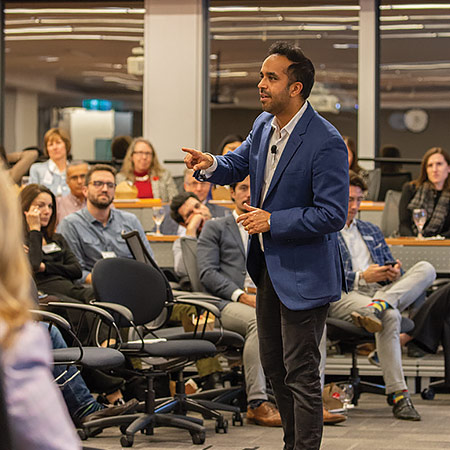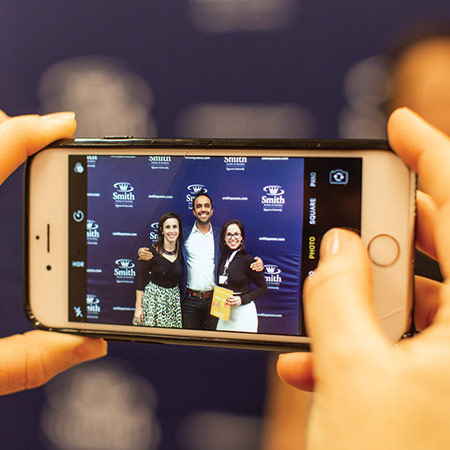Neil Pasricha knows you are awesome.

B
ut there’s a problem, which he spells out in his new book, You Are Awesome. “We are living in a world where we no longer bend – we break,” he writes. “When we spill, we splatter. When we crack, we shatter.” A third of college students have clinical anxiety according to The New York Times. Overall, panic attacks, depression and loneliness are on the rise.
One big problem, Pasricha says, is that we are no longer resilient.
You Are Awesome is a way forward. It’s a self-help guide for everyone (including Pasricha himself) to learn resilience. “To move from shattering to strengthening, from fragile to antifragile, from failure avoiding to failure resistant,” as he puts it.
Pasricha, BCom’02, is the author of five New York Times bestsellers, including The Book of Awesome, published in 2011, and The Happiness Equation, in 2016. He’s also a sought-after speaker. TED and SXSW are on his speaking resumé; he now gives more than 50 speeches a year, including one this past October to alumni at Smith Business Club Toronto. Recently, Pasricha (who lives in Toronto with his wife, Leslie, and their three children) started a podcast called 3 Books. In each episode he interviews the interesting – famous and sometimes not famous – about the three books that influenced them the most. His goal is to compile a list of the 1,000 most formative books in the world.

As for his latest book, Pasricha hopes that You Are Awesome teaches people how to be stronger, deal with failure and live what he calls “an intentional life”. Every problem, he says, is an opportunity. Events that appear to be a step back can eventually become a step forward. As evidence, he writes about his own failures – in life and career – and how he recovered. And he relates the lessons he learned from his parents. His mom grew up in Kenya; his dad came from India. Both immigrated to Canada, settling in Oshawa, Ont., where Neil was born.
He describes his parents as the epitome of resilience. “I learned from them to always leave your options open, never stop learning, never stop moving forward,” Pasricha said in an interview with Smith Magazine recently. Here are edited excerpts from that interview, in which Pasricha talks about the lessons to be found in his book, the conversation that caused him to write it, feeling awesome, and his secret to coming up with super-creative ideas (hint: it can work for you too).
You point out that You Are Awesome is about dealing with change, failure and living an intentional life. What exactly is “an intentional life”?
We are all [on average] only alive for 30,000 days. That feels like a long time. But it’s actually quite short. So an intentional life is where every single day you are living the best that you possibly can. My first book (The Book of Awesome) was about gratitude and my most recent (The Happiness Equation) was about happiness. This new book is about resilience. These are all major themes of living an intentional life. I'm also interested in themes like trust and family relationships. These are all elements to living the richest, most fulfilling and most intentional life possible.
So an intentional life is really about fulfillment?
Yes but the key word is “intentional”. There are a lot of ways to live. One way is where you're in the back seat of the car. The sun is still going up and the sun is still going down. But you will be a passenger cruising. You will be in the job that you ended up in. You will go to a school that maybe your parents suggested. You might take a program because it accepted you. You might end up marrying the first person who asks you. My point is, that's one way to live.
The other way is to live intentionally. That's where you are in the driver's seat of your life. You are thoughtful about your decisions. You pause before taking action. You remember and realize that you live your life, not anyone else. Shedding some of the parental, familial and cultural pressures is a huge part of how I perceive intentional living. I’m a massively independent person and part of what I teach is to live your own life. Your parents aren’t going to be alive for half your life. So you have to make the decisions you want to make for your life.
Why is this book about resilience?
It started when a guy ran up to me after one of my speeches. He had a really concerned look and said, “Neil, what’s wrong with my son? And what do I do about it?” And I said, “I don’t know. What’s wrong with your son?” And so he told me that his son graduated from high school at the top of his class, he was the valedictorian and the captain of the football team. And I said “Yeah…?” And his son went to Duke University, and he got a full scholarship, and he made the dean’s list. And I said “Yeah…?” And his son got a great job at a very important company with a top salary. And I said “Yeah…?” Then he told me that the first day his son was on the job, he got an email from his boss that his son perceived to be rude. And that night, the son called his dad crying. He said he didn’t think he could go back to work there again.
“Every good idea I've ever had can a hundred per cent be traced back to a day when I was wandering around thinking.”
How did that conversation affect you?
I realized that we are all so fragile now. We live at a time when we’re all raised with gold stars, everyone makes the dean’s list, everybody is told that they can do everything. On top of that, we live in a pretty good era [here in Canada]. We don’t have wars or famine or plague. No one’s getting sent to any trenches. So we’ve actually ended up pretty soft. And the issue with all of us – and I'm including myself – is that we no longer have the tool kit to handle failure, or even perceived failure. That’s what happened with the crying son. He never built up the musculature to handle that situation. I wrote this book to give myself and my children some of the framework to build up that muscle. Because the world is going to constantly be slapping you down. →

Does social media contribute to our lack of resilience?
Yes. The whole job of Instagram is to tell you that you don't have enough “likes” or followers. You could eat a great meal at Ban Righ at Queen’s. But if you check Instagram, one of your friends is at a lobster buffet in Malibu. There's just no way you can win. Everything about the design of social media is to create giant issues with our self-worth and self-confidence. On social media, all we're being shown is everybody else's greatest-hits life. And we're comparing it to our own crappy director’s cut.
You write openly about your own failures. Your first marriage ended in divorce. You did not last at your first real job out of school, with Procter & Gamble. Were those shortcomings tough to admit?
The crazy thing is they were so hard to write down. But once I released them to the world, all the hesitation, the worry, the anxiety, the stuff you hold in your heart because you’re afraid to share it, almost entirely dissipated. There’s a chapter in the book called “Reveal to Heal” that talks about opening up about failure. It’s important that we crystalize and release our anxieties. That’s how we remove them from our brain.
You suggest that to succeed, people should fail more often. What do you mean by that?
What I’m telling people is, don’t just be satisfied with doing one thing well. If you ask a lot of adults what they do, they’ll say something like, “I run marathons.” That’s it. That’s all they do. And they end up narrowing themselves and, as a result, they become worse at everything else. Researchers call this “cognitive entrenchment.” We become mentally fragile because we stop trying and failing at new things.
A recent study showed that [many] Nobel Prize winners are also amateurs at completely unrelated disciplines. They’re amateur ballroom dancers or amateur photographers. The researchers found that when you do more things, you open your mind up to being successful in the things you already do. A good example is Steve Jobs doing calligraphy at Reed College and how that affected the typography that went into Apple computers.
People should try a new hobby every Saturday. Don’t just play one sport; play eight. Always have something new that you are doing and sucking at because that will dramatically accelerate your learning rate.
You also recommend that people take what you call “untouchable days” from work, during which they are out of the office, off the grid and unreachable. Why?
Let me explain it this way: When the Internet first started, there was this thing called the pop-up ad. You went to Webcrawler.com, and suddenly a giant, garish, flashing, loud screaming thing maliciously hijacked your screen. And everyone hated those things. In fact, there were even laws passed banning pop-up ads.
Well, guess what? The world is now a pop-up ad. It's gone from a thing on our browser to us living inside of it. Social media is like a drug on our phones. Social media never stops scrolling, which is really bad for our brains. Our brains don’t know how to handle endless scrolling. Just like you don’t know how to stop at an all-you-can-eat buffet, you don’t know how to stop on Instagram or Twitter. My point is that we suffer from NDD, which is Nature Deficit Disorder. We’ve lost nature time, contemplation time, the fermenting of creativity, painting outside the lines time, mindful exploration time, true intellectual pursuit.
“Always have something new that you are doing and sucking at because that will dramatically accelerate your learning rate.”
And the solution is to take an untouchable day?
Yes. Untether yourself from the matrix that we live in and watch as your creativity, your ideas and your productivity actually increases. Start by just disappearing at lunch. Go for a walk – no cellphones, no contact with anybody. I guarantee that when you return that afternoon you will be more productive, more creative and you will get more done. And then maybe one day you will take an untouchable afternoon or an untouchable day. And when you come back to work with a good idea, you can say to your boss, “You know that great idea I had? I got it that day I took off at lunch to think about our strategy.”

So what do you do on your untouchable days?
First, I plan them out 16 weeks in advance. The only other things I normally book that far out in my calendar are my speaking engagements. So if, say, I look at my schedule for April, all my speaking is booked. I know that on April 1 I’m in San Diego and on April 7 I’m in Texas. So I’ll put an untouchable day on April 8. And when I get home from Texas on the evening of the seventh, I’m so excited about the next day. I’ll drop my kids off at school and wander around Toronto all day. I’ll go to the park. I’ll go to a coffee shop. I’ll have cue cards and markers in my pocket. I won’t have a cellphone and I won’t talk with anyone. Not even my wife. She knows it’s an untouchable day. And when I get home at four and see my kids, I’ll feel like I’m Mick Jagger on stage. I’m so full of energy. I’m an incredible father, I’m an incredible husband. I’ll have five new ideas that I can’t wait to execute. The idea for my podcast came from an untouchable day, the idea for my blog, my books – every good idea I’ve ever had can a hundred per cent be traced back to a day when I was wandering around thinking. Now, people will say, it’s easy for you, Neil. You’re a writer so you can do that. No, no, no… I’m a writer because of untouchable days.
Do you hear from people about the impact that your books have had on them?
Yes, some folks have kindly suggested that I helped them move away from dark thoughts or helped them focus on what really matters. I always tell them that they just found something that always existed inside themselves. The truth is, the world today is constantly coaching us away from listening to what we already know is important. →
What’s the best compliment you ever got about your books?
Someone once told me, “Neil, you write self-help books that don’t sound like self-help. Your books don’t tell me what to do; they show me how to do things.” After The Book of Awesome was published, people told me that they started seeing good things everywhere. And, you know, I never told them to look for those. They just did it and they started to feel super happy. In my books, my goal is never to preach, but to simply share ideas openly.
You recently started your own podcast, called 3 Books. How did that begin?
This goes back to the fact that I never used to read a lot of books. Before my wife Leslie and I were married, she would come over to my place and wonder why I had so few books. She’d say, “You’re a writer. Why don’t you have books?” And I would respond that I didn’t have time to read. That’s what everyone says, right? They don’t have time.
The truth is, I did read about five books a year, which is about as many as most people. But then I slowly began to put systems in place to read more. And one year, in 2016, I read 50 books – so 10 times more than I used to. And I noticed that I felt happier. I was better in my work. I wasn’t as distracted. I felt healthier and more informed. I was more interesting at parties. Everything felt better.
So I wrote an article called “8 ways to read (a lot) more books this year”. It became one of the most popular articles on Harvard Business Review’s website for all of 2017. The reason is that everyone wants to read more. They know it’s good for you. But like me, they felt they didn’t have the time. But when I looked deeper, that wasn’t really the reason. I found the root issue is that people don’t know what to read. Amazon has millions and millions of books. That’s too overwhelming and why things like Oprah’s Book Club and Heather’s Picks are extremely popular. We are desperate for a curation vehicle. So in each episode of my podcast, I speak with someone about their three formative books.
Many people you feature on your podcast, such as Malcolm Gladwell, Angie Thomas and James Frey, are well known. But you also interviewed a bartender and an Uber driver about their formative books.
When I look for people to speak with on my podcast I’m not looking for famous; I’m looking for interesting. And if I only interviewed people like me, I wouldn’t learn anything. One of my recent podcasts was with a woman named Soyoung Kim. She owns a variety store in downtown Toronto. She came to Canada from Korea and reads 50 books a year. That’s how she taught herself English. Her story is amazing.
Since you ask others to name their formative books, what’s your top read?
Solitude by Michael Harris. If loneliness is “alone and sad” then solitude is “alone and happy.” This book helps us to develop that rarely used muscle.
You’ve made a career of helping people to become awesome. So what makes you feel awesome?
When the TV isn’t blaring when you walk into the hotel room. When the swing my three-year-old is screaming for at the park is free. Finding the browser tab making that horrible music and closing it. The crowd walking out of the arena together after the home team won. Finding a really good voicemail on my phone that somebody left five months ago. Dancing at concerts. Changing socks and underwear in the middle of the day. Successfully memorizing the unwieldy nine-digit meeting room conference code and typing it in right on the first try. The bite of the Popsicle after it’s rock-hard frozen but before it starts to melt. Super-polite drunk people. Having a very specific kind of favourite pen. When nobody at dinner pulls out their cellphone the whole time.
One last question: In a few words, what’s the overall message you hope people take away from You Are Awesome?
That we are too hard on ourselves. The book just offers ideas to feel less stressed.
